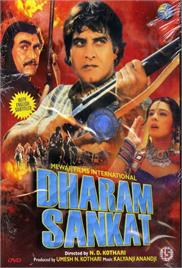Be Careful of Fake Websites. Always use HindiMovies.to domain & Join our Telegram Channel for Latest Updates.

Likes: 27
Views: 4.39K
Dacait Jagira (Amrish Puri) has terrorized the entire country-side with his raids and cruelty. On one such encounter he kills Gopal’s mother, leaving him an orphan. Durga (Rohini Hattangadi) takes care of Gopal and raises him as her own son, Birju. Years pass by, Gopal (Raj Babbar) and Birju (Vinod Khanna) have grown up. While another band of dacaits is raiding their village, the leader Sohn Kanwar (Sahila Chaddha) is about to kill Birju, when she is told that his mother is Durga, and she spares him, due to Durga being the wife of Dara (Dara Singh), another dacait. This revelation unleases a tide of hate against Birju and Durga, and they are forced to leave the village. To make matters worse, Gopal disowns any relationship he has had with both of them, and wants to marry Madhu (Amrita Singh), who loves Birju. Gopal becomes a police inspector, and Birju is forced to bear arms and become a dacait. Birju also brings Madhu with him, and this does not fit in with Sohn Kanwar’s plans that she has for Birju. To make matters worse, the Police Commissioner (Vikram Gokhale) issues a substantial reward to bring in Birju dead or alive.
Released: 1991
IMDb Rating: 4.3/10 (13 Votes)
Genre: Action, Drama, Family, Hindi Movies
Stars: Vinod Khanna, Amrita Singh, Rohini Hattangadi, Sahila Chaddha
Directors: ND Kothari
Writers: Achala Nagar
Year: 1991
Server 1 – Youtube
Server 2 – Youtube
Dharam Sankat (1991): A Classic Blend of Action, Drama, and Family Emotions
Introduction:
Released in 1991, Dharam Sankat stands as a remarkable example of Hindi cinema's ability to merge action-packed sequences with gripping familial drama. This movie delves deep into the emotional and moral dilemmas faced by its characters, providing a captivating narrative that resonates with audiences who appreciate the nuances of human relationships intertwined with the challenges of life. Situated within the action, drama, and family genres, Dharam Sankat offers a powerful cinematic experience that is both entertaining and thought-provoking.
Plot Overview:
At its core, Dharam Sankat narrates the story of a man caught between the complex demands of his duties and the emotional turmoils of his personal life. The title itself, which translates to "Religious Dilemma" or "Moral Crisis," encapsulates the essence of the protagonist's journey. While the film utilizes the typical Bollywood elements of dramatic confrontations and familial bonds, it also brings forth intense action sequences that add a dynamic edge to the storyline.
The protagonist is challenged by circumstances that test his faith, principles, and loyalty, especially when his responsibilities towards his family conflict with his moral compass. These conflicts unfold against a backdrop of societal pressures, expectations, and the harsh realities of life, making the narrative not only engaging but also emotionally resonant.
Main Actors:
Direction and Writing:
The visionary direction of Dharam Sankat guides the film through its action and dramatic beats with commendable finesse. While specific details about the director and writer are not enumerated in the IMDB brief, the craft behind the storytelling is evident in the cohesive narrative structure and the effective interplay between intense action sequences and emotional moments. The writing lays a solid foundation for exploring themes of morality, family honor, and societal expectations.
Cinematic Approach and Themes:
The film operates within the conventions of early 90s Bollywood cinema, where the blend of action and family drama was a popular formula. However, what distinguishes Dharam Sankat is its commitment to exploring the protagonist's ethical challenges, positioning the movie as more than just a typical action feature.
Thematically, the movie delves into the concept of "dharam" (duty or righteousness) facing crisis, especially in personal contexts. This theme holds cultural and religious significance in Indian society, adding layers of meaning to the protagonist's struggles and decisions.
Music and Songs:
Unlike many Bollywood movies of its era, Dharam Sankat does not have detailed public records of a song soundtrack or prolific musical numbers associated with it. The emphasis of the film leans more towards its dramatic storyline and action sequences rather than focusing on musical elements. This might indicate a narrative choice to keep the story grounded in realism and intensity.
Conclusion:
Dharam Sankat (1991) stands as a film that intertwines action and family drama to pose profound questions about duty, morality, and loyalty within the fabric of Indian society. Anchored by the star power of Vinod Khanna and Amrita Singh, the movie offers audiences an engaging look at the personal challenges behind broader social duties. Though it might not be filled with the typical song-and-dance extravaganzas typical of Bollywood films of its time, its core remains a compelling story about a man’s struggle to uphold righteousness amid life’s toughest trials.
For cinephiles interested in early 90s Hindi cinema that prioritizes storytelling and character dilemmas, Dharam Sankat is well worth exploring.